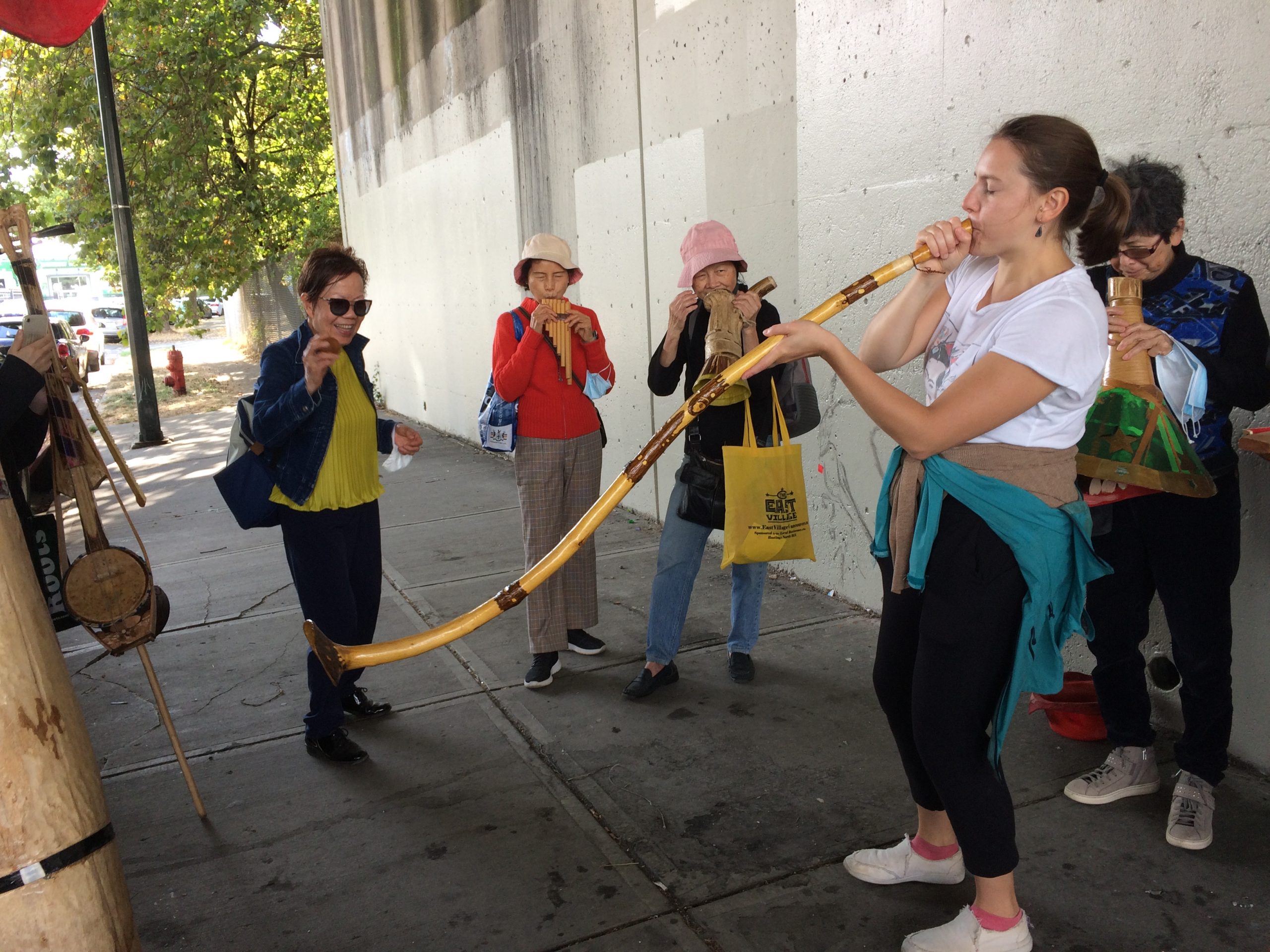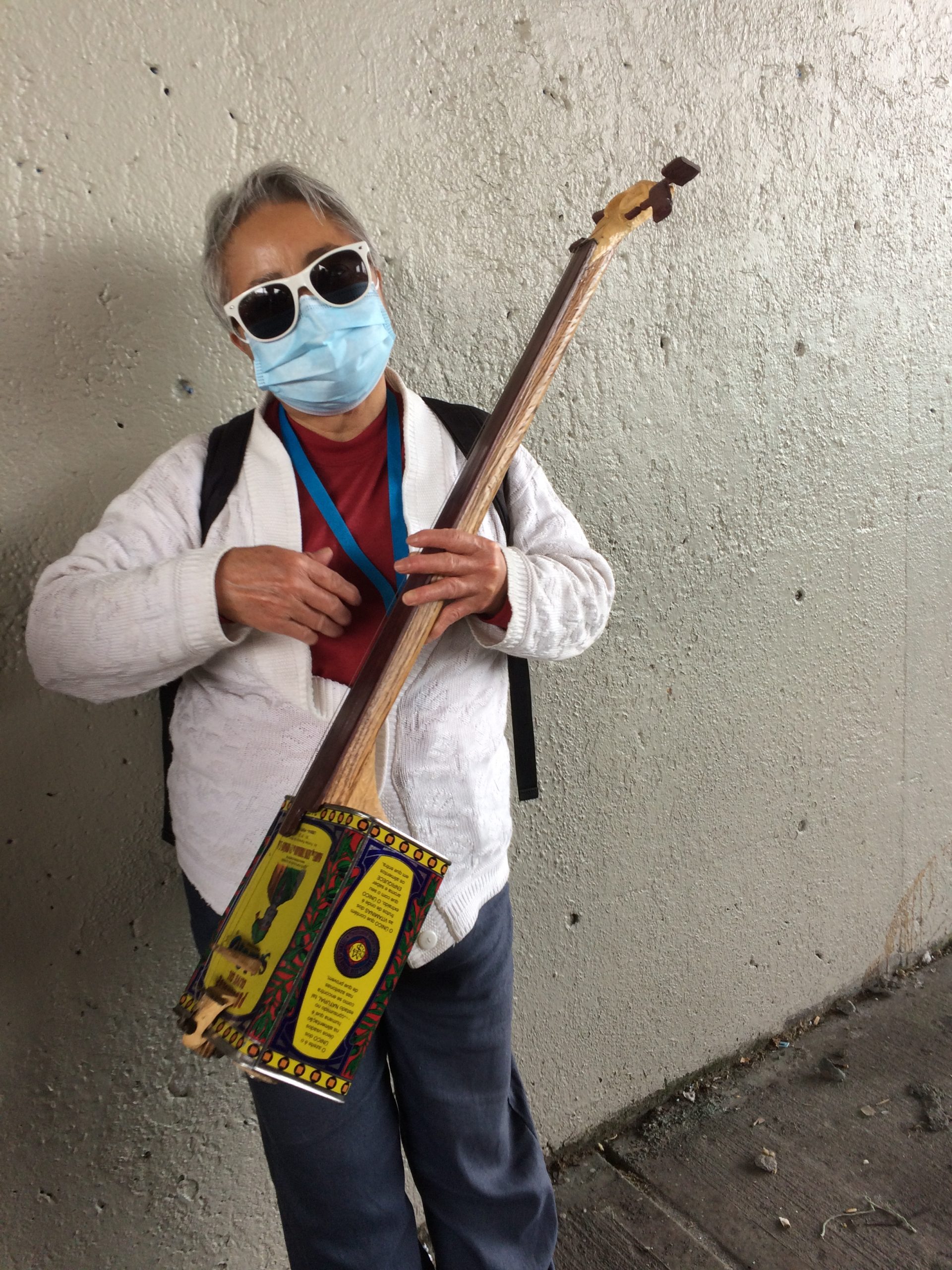More than you might think. It’s a way to make learning more fun and create social connection for immigrants, refugees and seniors in the Downtown Eastside.
March 25, 2024
Story by Alex Wyatt and Geoff D’Auria. Video footage by David Gowman. Video editing by Kriesha Pradhan.
Last fall, learners from the English Conversation Program (ECP) spent an afternoon clanking cymbals, blasting horns, and beating drums at Oncle Höonki’s Fabulous Hornshop.
In this case, it was the ECP program’s Sing & Learn and Songwriting groups and it was their first outing since the pandemic: old members reunited, and newer members were introduced to each other in-person. They held a parade and marched along with Oncle Höonki, then they had a group jam at an underpass (see video).
“It was a celebration,” ECP Coordinator Spring Gillard said. “It was joyful.”
It may have been joyful, but how does a musical parade with funny instruments led by a man who calls himself Oncle Höonki turn into meaningful learning?
In Spring’s words, a field trip like this allows for “language learning by stealth,” adding that more and more research is emerging about the positive effects of arts-based language learning. Music, in particular, offers a way for people to learn English without feeling like they are learning. It helps with recall, builds confidence, fosters strong connections with other learners.
Fun learning backed by scholarship
Spring would know. Along with a former volunteer UBC student facilitator, Natalia Balyasnikova, she has been documenting the arts-based approach to language learning in several journal articles that focus on adult learning (see references below):
“Arts-based activities have been found to increase cognitive abilities in senior language learners and help them develop more agency in their learning journeys and supports their desire to keep physically active,” she wrote in a paper co-authored by Natalia, who completed her PhD working with ECP learners, is now a faculty member in Education at York University, and who credits her time at the Learning Exchange with fundamentally transforming her academic direction and her understanding of what universities are and can do.

“Music is just one arts-based method used by educators to foster embodied learning. Other approaches we have employed for language learning include storytelling, drama, poetry, and dance. These powerful strategies facilitate language learning while creating a safe, inclusive learning community.”
The English Conversation Program is a free program at the UBC Learning Exchange for immigrants and refugees who want to practice their English and connect with others. UBC student volunteers, like Natalia, or community volunteers lead the sessions. Some sessions are specifically for seniors (called “Seniors Thrive”) and involve arts-based language learning through workshops and field trips like this one.
Celebration is foundational, as is connection
“Celebration is a foundational principle of the Learning Exchange,” Spring explained. “When we celebrate together, it provides more opportunities for social connection and group bonding. In our evaluation of Seniors Thrive activities, we also found that the learners loved to perform—having a goal to work towards was part of their learning journey.”

According to Yu Li, English Conversation Program participant standing proudly here with an instrument, this kind of learning “…makes you young!” Photo by Spring Gillard.
Battling social isolation in the Downtown Eastside is also one of the program’s priorities, which became even more challenging over the COVID-19 period. But participants and facilitators rallied and moved activities online. Even the choir managed to meet on Zoom.
“It wasn’t without its technical and logistical challenges,” said Spring, with a laugh. “But the choir members did not seem to mind any lag issues and bad microphone connections. They still showed up committed to every session.” She said that for many, these meetings offered structure and social connection through an incredibly isolating time—and a source of joy during rough spots.
So, it is not surprising the field trip with Oncle Höonki turned into such a joyful celebration. It was a reunion.
Who is Oncle Höonki?
ECP facilitators came across Oncle Höonki accidentally. While out at a community event, they happened upon a studio in Maclean Park. David Gowman—or Oncle Höonki as he prefers to be called in this space—was outside, carving a large community loom.
Oncle Höonki’s Fabulous Hornshop is part of the Vancouver Park Board’s Fieldhouse Activation Program, where caretaker suites or cottages in certain parks are transformed into creative spaces for local artists. Oncle Höonki has been in the space since 2015 and has built a tight-knit community of artists and musicians along the way. His instruments, many of which are hand-carved by Gowman himself from trees grown in a nearby community garden, are often whimsical and look like something from a Dr. Seuss book.
A fountain of youth
For Yu Li, a regular ECP participant, the reason for learning English, singing choir, and joining field trips with the likes of Oncle Höonki and his fun instruments is simple: “It makes you young!”
Learn more about Seniors Thrive and the ECP program on our website or contact Spring Gillard at spring.gillard@ubc.ca for more information.
Research Citations
Balyasnikova, N. & Gillard, S. (2018). I love to write my story: storytelling and its role in seniors’ language learning. The Canadian Journal for the Study of Adult Education (CJSAE) <30(2), 81-90.
Gillard, S. & Balyasnikova, N (2021). They gave me back my power: Strengthening older immigrants’ language learning through arts-based activities. Studies in the Education of Adults, 1-18. Retrieved from: DOI: 10.1080/02660830.2021.1911109